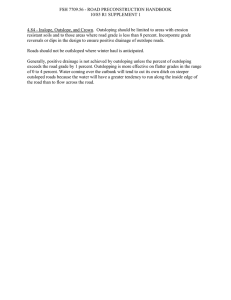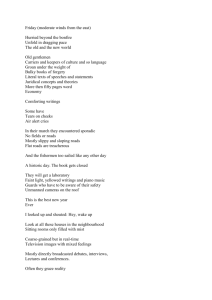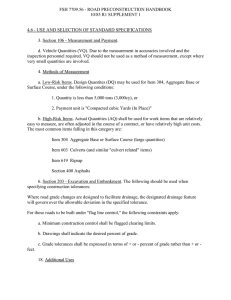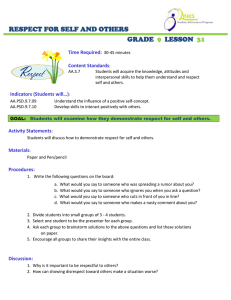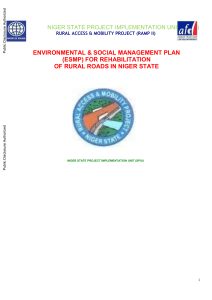Document 14602042
advertisement
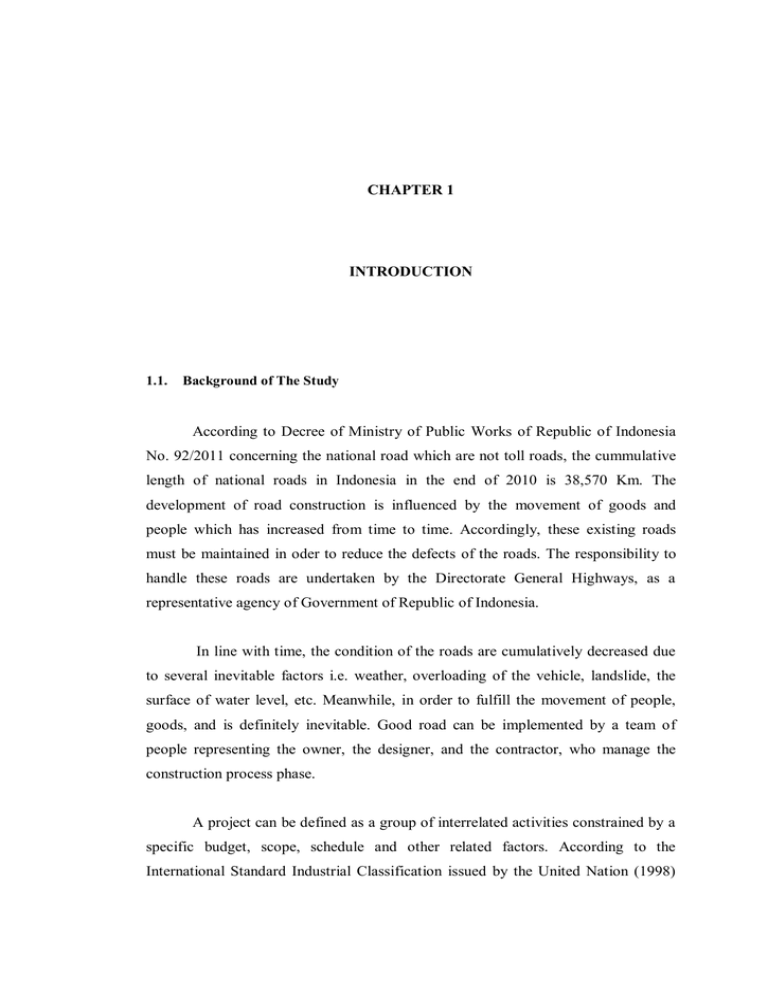
CHAPTER 1 INTRODUCTION 1.1. Background of The Study According to Decree of Ministry of Public Works of Republic of Indonesia No. 92/2011 concerning the national road which are not toll roads, the cummulative length of national roads in Indonesia in the end of 2010 is 38,570 Km. The development of road construction is influenced by the movement of goods and people which has increased from time to time. Accordingly, these existing roads must be maintained in oder to reduce the defects of the roads. The responsibility to handle these roads are undertaken by the Directorate General Highways, as a representative agency of Government of Republic of Indonesia. In line with time, the condition of the roads are cumulatively decreased due to several inevitable factors i.e. weather, overloading of the vehicle, landslide, the surface of water level, etc. Meanwhile, in order to fulfill the movement of people, goods, and is definitely inevitable. Good road can be implemented by a team of people representing the owner, the designer, and the contractor, who manage the construction process phase. A project can be defined as a group of interrelated activities constrained by a specific budget, scope, schedule and other related factors. According to the International Standard Industrial Classification issued by the United Nation (1998) 2 defines construction as constructing, altering, repairing and demolishing building; roads, street, bridge, railways, airports, dams, etc. Project can also be defined as the entire process required to produce a new product, new plant, new system, or other specified result (Archibald, 2003). It also be defined as a narrowly defined activity which is planned for finite duration with a specific goal to be achieved (General Electric Corporation, 1983). In this research, the definition of cost performance is the actual cost paid from owner’s perspective to the contractor based on the works that had been done. The cost performance can be called success if the actual cost that has been paid to the contractor is less than budget planned in that particular of time. Moreover, time performance can be called success if the actual duration of project to complete the work is less than time planned. Meanwhile, the definition of time perfomance is the actual work performed by the contractor can be completed in specified time. 1.2. Problem Statement The completion of the project without any cost overrun and time delay are the objectives of the owner. In this study, the owner comes from the public sector which has different objectives with the owner from private sector regarding to the cost. The owner has focuses only on cost,time, and quality performance callled project performance. These three factors will affect the scope i.e. outcome which are the ultimate objective of the owner. 3 1.3. Objective of Study The objectives of this study are: a) to identify what are the significant factors affecting the success of project on highway construction project; b) to identify the correlation between factors affecting project performance in multiple regression analysis; 1.4. Research Questions This study investigates the project performance of road projects from the viewpoint of the public owner. A total of 13 success factors will be identified from literature and the opinions of project managers and other experienced engineers. Data was collected from various projects handled by the Directorate General of Highways (DGH) in Indonesia. 1.5. Significance of Study Owners need to know what factors affecting project performance from literature review. Hopefully, the project participants would be aware of these factors when making a choise of decision. These factors also affect on outcome and impacts of the road project performance. 1.6. Scope and Limitation of the Study To identify the objective of the study, the reseacher will distribute questionnaire who are in charge as owner’s project manager. Projects relating to this study are on going when the researcher doing the study. Even though, the project 4 were not completed yet but the project keeps maintain good performance without any delay and cost overrun issues and other causes on project performance. According to Odusami (2003) some of measures are perplexing due to the inconsistency of the respondent’s judgement. Based on previous research, the parameter of success projects is limited and focuses on cost and time performance. However, there are questions relating to quality performance but not as much as cost and time performance. Actually the contractor have their own criteria of project performance, which can be different with the owner’s perspective. The projects is still on progress when the study was conducted. 1.7. Thesis Structure This study is composed of five chapters as follows: Chapter 1 presents the introduction which is including background of the study, problem statement, objective of the study, scope, importance and methodology Chapter 2 will reviews literature review relating factors affecting project performance. Chapter 3 describes the methodology that adopted to conduct this research, which describe the object of study, finding data method, analysis method. Chapter 4 presents the results of analysis from questionnaire and data collection. Chapter 5 presents the conclusion of this research and recommendations for future research.
